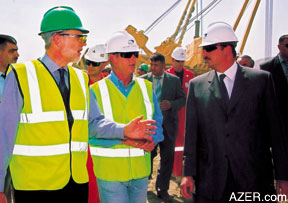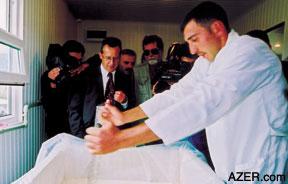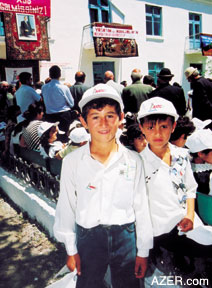|

Autumn 2003 (11.3)
Pages
78-79
BP Current Developments
BTC Pipelaying
Begins
by Tamam Bayatly
  Left: President of BP Azerbaijan David Woodward, BTC
Director Michael Townshend and Azerbaijan's newly elected Prime
Minister Ilham Aliyev visit Sangachal where the first BTC pipe-laying
took place. August 11, 2003. Left: President of BP Azerbaijan David Woodward, BTC
Director Michael Townshend and Azerbaijan's newly elected Prime
Minister Ilham Aliyev visit Sangachal where the first BTC pipe-laying
took place. August 11, 2003.
A major
milestone took place in Azerbaijan on July 25, 2003, when the
first BTC (Baku-Tbilisi-Ceyhan) pipe was physically laid down
near Sangachal Terminal. This marked the first BTC pipe to be
laid in the three countries - Azerbaijan, Georgia and Turkey.
The pipe-laying is progressing on schedule across the country
from east to west. To date more than 20 km has already been laid
in Azerbaijan.
More than 31,500 pipe joints, totaling about 370 km (about 80
percent), have already been delivered to Azerbaijan. The pipe
is being stored at pipe yards strategically placed along the
pipeline route. In addition, more than 35 km of pipe (3,000 joints)
has already been welded.
On July 22, the first residents moved into Mugan Construction
Camp. Similar camps are planned at four locations - Kurdamir,
Yevlakh, Ganja and Poylu - to support the construction activities
as the operation moves towards the Georgian border.
At Sangachal, work on the BTC Head Pump Station PS-A1 is progressing
well, with a number of major foundations, including those for
the Main Oil Pumps, already completed. Overall BTC construction
is now 35 percent completed.
The project remains firmly within budget of $2.95 billion and
on schedule for completion by the fourth quarter of 2004, in
anticipation of the export of First Oil from the Azeri Development
in the first quarter of 2005.
  Left: The first cheese being produced at a plant in
Guba. June 18, 2003. The creation of this and 3 other cheese
plants was supported by BP. Left: The first cheese being produced at a plant in
Guba. June 18, 2003. The creation of this and 3 other cheese
plants was supported by BP.
Community Grants
In August, BP as operator of the Baku-Tbilisi-Ceyhan (BTC) and
the South Caucasus Pipeline (SCP) projects announced grants for
the implementation of its Community Investment Program (CIP).
The Program directly aims to assist the 82 communities along
the pipeline corridor and focuses on income generation, agricultural
development, social infrastructure and health awareness.
BP will spend $8 million in community investment and an additional
$2 million in environmental investment in Azerbaijan through
2006. They are currently involved in intensive discussions with
multi-lateral and bi-lateral agencies to decide plans beyond
2006. In Azerbaijan grants were awarded to the following organizations:
Foundation for International Community Assistance (FINCA Azerbaijan),
International Rescue Committee (IRC) and Save the Children.
Bottom: Two youth attend the
opening ceremony of the school in Agalyg village in the Davachi
District of Azerbaijan. Recent construction work was sponsored
by AIOC.
  IRC
will be working on the eastern part of the pipeline route and
Save the Children on the Western part up to the Georgian border.
IRC has contracted with national NGO (non-governmental organization)
partners such as Agro Information Center (AIM), Toward Civil
Society (Mulki Jamiyyata Doghru) and Ganja Business Group (GBG)
The program is estimated to benefit approximately 160,000 people. IRC
will be working on the eastern part of the pipeline route and
Save the Children on the Western part up to the Georgian border.
IRC has contracted with national NGO (non-governmental organization)
partners such as Agro Information Center (AIM), Toward Civil
Society (Mulki Jamiyyata Doghru) and Ganja Business Group (GBG)
The program is estimated to benefit approximately 160,000 people.
Save the Children will focus on 48 communities along the route
between Yevlakh and the Georgian border and work with two local
partners, Umid and AIM.
International Medical Corps (IMC) also was awarded a grant for
health projects, extending the entire length of the Azerbaijan
section of the pipeline route. IMC will work with a group of
four local partners, including the Ministry of Health National
Reproductive Health Office (NRHO), Shafali Allar (Caring Hands),
Azerbaijan National Nurses Association (ANNA), and Azerbaijan
Women and Development Center (AWDC).
The total value of these CIP grants is $5.5 million, which will
fund projects that continue for at least two years. The remainder
of the CIP money will be allocated later, following public announcements.
The Azeri Project
Construction works for Central Azeri (Phase 1) of the Azeri Development
Project are progressing on schedule and are 70 percent complete.
The project has an excellent safety record: more than 15 million
man-hours have been carried out without the loss of a single
day away from work at Sangachal on the topsides construction
and subsea pipelay. More than 6,000 Azerbaijanis are currently
employed.
The Living Quarter modules for the Central Azeri production,
drilling and quarters (DQ1) platform arrived in Baku in July
from Sweden where they were built by Pharmadule Emtunga. The
mini modules were built abroad and delivered from Gothenburg
via both northern and southern canal routes, on a fleet of three
river vessels in three shipments. The modules arrived at Baku's
SPS shipping berth and have been successfully installed on to
the Topsides Deck. The Living Quarters consist of 48 mini modules
and provide a 300-bed facility during the offshore hook-up phase,
reverting to 200-beds during operations.
Drilling Modules
Arrive
All four shipments of the Drilling Modules and associated equipment
for the Central Azeri production, drilling and quarters (PDQ)
platform have also arrived in Baku from France where they were
built by Eiffel. Assembly and commissioning will take place at
the SPS yard in Baku.
The Drilling modules left France in July and arrived in Baku
on September 2nd. Once the modules are successfully off loaded
at SPS, they will be installed on the integrated deck by mid-October.
The Drilling Modules for the Central Azeri platform are comprised
of three main components: Drilling Support Module (DSM), Drilling
Equipment Set (DES) and Drilling Derrick. The modules are designed
to provide drilling from 48 slots during the operational life
of the Central Azeri PDQ platform.
Azeri Project Subsea
Pipelay
The subsea pipelay activities for the Central Azeri project began
near Baku late June. They involve laying 186km of 30-inch pipe
to connect the Central Azeri production, drilling and quarters
platform with the Sangachal Terminal onshore. The pipelay will
be conducted in water depths up to 200 meters.
The pipelay activities are supported by various local Azerbaijan
companies, including SOCAR facilities, KMNF Marine Alliances,
SPS Marine support base, EUPEC Pipecoatings joint venture with
AZPETROL.
The pipe has been manufactured in Germany and Japan and delivered
to Baku via the Russian port of Novorossiysk on the Black Sea.
While 200 km of the pipe-coating was applied in EUPEC's coating
facility in Dunkirk (France), the rest has been done at the EUPEC
Azerbaijan coating plant in Baku, a world-class facility and
the largest in the Caspian region.
The installation of the landfall sections of both the 30-inch
oil and 28-inch gas pipelines were conducted this summer at the
beach pull site in Sangachal Bay. The main trunk lines will be
laid out to Central Azeri through the winter and early spring
next year. This will enable the pipelines to be connected to
the Central Azeri platform before the topside facilities are
connected in the summer of 2004.
Israfil Huseinov
- Pipelay Barge
The upgrade of the pipelay barge Israfil Huseinov began in early
2002 with capabilities to lay pipelines of 32-inch diameter in
up to 300m water depths. The new semi-automatic welding equipment
is supported by the latest development in ultrasonic non-destructive
testing systems. The barge now has a new heli-deck, a new 60-ton
crane, refurbished cranes, mooring winches, substantial redevelopment
of the living quarters to accommodate 275 workers, on-board safety
and life support systems, new fire detection and suppression
systems, and two new generators to support the original five
Gorky Diesel units in the engine room.
The entire upgrade program has employed 400 Azerbaijanis and
involved nearly 140 suppliers and sub-contractors, the majority
of which were local companies.
Shah Deniz Contracts
This past summer, the Shah Deniz partners announced the main
contract awards for engineering, procurement, fabrication, construction
and drilling activities associated with the recently sanctioned
Stage 1 development project of the Shah Deniz Gas and Condensate
field in the Azerbaijan sector of the Caspian Sea. In February
2003, the Shah Deniz Stage 1 Upstream and Midstream Development
Projects were sanctioned, committing an investment of $3.2 billion
to the project.
The main contract awards include: two contracts to Technip-Coflexip
(France) for the offshore platform design/procurement and for
transport and installation activities. An additional contract
for the in-country assembly of TPG 500 Offshore Platform is being
finalized this month.
Keppel Fels (Singapore) won the contract for fabrication and
construction of the hull and topsides. KCA DEUTAG (UK/Germany),
an international drilling subsidiary of Abbot Group, was awarded
two contracts for platform drilling services. National Oilwell
(Norway) will be supplying drilling equipment.
Kellogg Brown & Root (USA) has been contracted for the design/procurement
of the onshore facilities to be built in the Sangachal Terminal
and for the design of the offshore pipelines.
Azfen/Tekfen Consortium (Azerbaijan/Turkey) will carry out construction
at the Sangachal Terminal onshore facilities, including main
storage tanks and onshore section of the upstream pipelines.
McDermott Caspian Contractors (USA) will install three upstream
subsea pipelines from the TPG 500 Offshore Platform to the Sangachal
Onshore Terminal. Nymo Mek Verksted (Norway) will supply Drilling
Skidbase and Substructure Fabrication (SSF).
Caspian Drilling Company (CDC), a joint venture between SOCAR
and Global Santa Fe, will be involved in pre-drilling operations.
South Caucasus
Pipeline
Construction on the South Caucasus Pipeline (SCP) will be implemented
by the same BP Project Team using the same pipelay and facilities
contractors. It will occupy the same corridor as the Baku-Tbilisi-Ceyhan
(BTC) oil export pipeline, in order to minimize the environmental
and social impact and achieve capital and operating cost savings.
Contracts were awarded to Consolidated Contractors International
Company (CCIC) of Greece for the pipelay in Azerbaijan. Spie
Capag, a joint venture with Petrofac will be doing the pipelay
in Georgia and the above-ground facilities in both countries.
John Brown Hydrocarbons will be providing for design, procurement
and support services.
Cheese Factories
BP recently supported the creation of four small-scale cheese-making
facilities - two in the Guba district and two in Ismayilli -
to facilitate dairy production, strengthen livestock farmer associations,
and provide consumers with safe and healthy dairy products.
Construction of the plants and training of operators was made
possible through the financial and in-kind contributions by BP,
Land O'Lakes and USAID. The total value of the project was $67,130,
of which $32,400 came from BP, $17,010 from USAID and $17,720
from beneficiaries and other private donors. The project was
managed and implemented by Land O'Lakes, a USAID-supported organization
working in economic development.
The facilities include: The dairy processing plant Dogrul Yol
in Begrov village of the Guba district. Cheese production of
Edam, Bieno and white soft cheese began in May. Production at
Elvin located in Amsar village in the Guba district began in
April for Bieno and white soft cheeses.
Ruslan 6 began in May 2003 in the Talish village of Ismayilli
and produces white soft cheese and Ricotta. Garamaryam village
in the Ismayilli district has been producing soft white cheese
since June 2003.
The capacity of each of the four cheese-making plants is identical,
processing 400 liters of milk daily. With small modifications,
the plants can double their capacity to 800 liters. At present
more that 65 small dairy farmers serve as milk sourcing base
for these cheese-making plants.
Back to Index
AI 11.3 (Autumn 2003)
AI Home
| Search | Magazine
Choice
| Topics
| AI Store | Contact us
Other Web sites
created by Azerbaijan International
AZgallery.org | AZERI.org | HAJIBEYOV.com
|